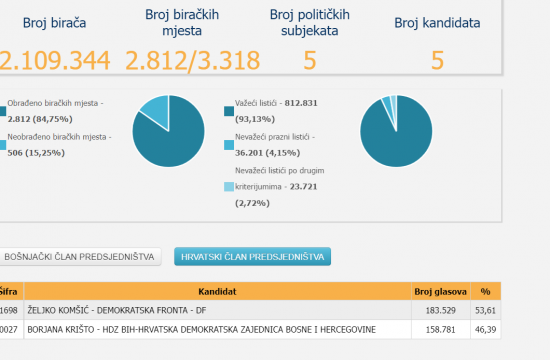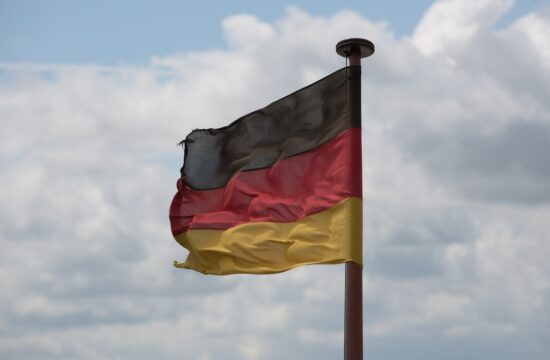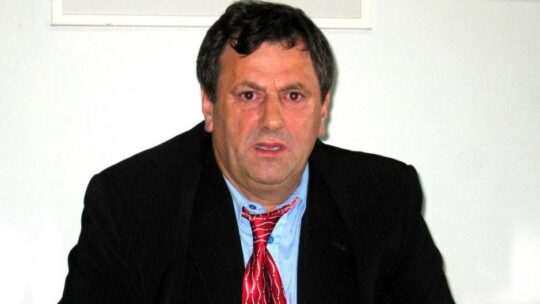
The draft law on electoral units that will on Thursday be discussed in the Parliament of the Federation (FBiH), one of Bosnia’s two semi-autonomous entities, is not steered against anybody and ensures equal representation for all ethnic groups, FBiH Parliamentarian Segmedina Srna-Bajramovic told N1 on Wednesday.
“People in Bosnia do not want to be ‘serfs’ from the middle ages who are ruled by nobility organised according to ethnic-nationalistic lines, but they want to be equal and free citizens,” Srna-Bajramovic, sho is also Vice President of the Social Democratic Party (SDP), said. “This law absolutely ensures the equality of citizens on the whole territory.”
Bosnia’s Election Law is a burning issue that has been plaguing the country since the Constitutional Court ruled two years ago that it violates the Constitution.
Bosnian Croat politician, Bozo Ljubic, had argued that the Croat influence in cantons with a majority Bosniak population was unfairly diminished in the selection of delegates and that it allows Bosniaks to elect the Croat member of the Presidency.
One of the issues was the Law’s provision dictating that cantons delegate at least one representative from each of the country’s three main ethnic groups to the FBiH's House of Peoples.
The other stems from the structure of the state. It composed of two semi-autonomous entities – one dominated by the Serbs, the other shared by Bosniaks and Croats.
Bosnia’s three-member presidency consists of a Serb chosen from the Serb-dominated entity called Republika Srpska, the other two from the Bosniak-Croat entity which is called the Federation of Bosnia and Herzegovina.
However, because they are numerically almost four times stronger, Bosniaks can elect both the Bosniak and the Croat member in the entity the two share. This defies the Constitution which guarantees that each of the three groups can elect their own representatives.
How exactly to implement the Constitutional Court’s decision and not violate people’s right to vote for whoever they want is an issue political leaders have not been able to agree on.
For some of them collective rights of national groups are more important than individual rights of citizens and others believe the opposite.
A lack of agreement on this matter could produce a post-election crisis and the result of the election could be declared invalid if it continues to violate the Constitution. That would leave the country and the Bosniak-Croat entity without a functioning government.
To solve the issue, five Bosniak and opposition parties from the Bosniak-Croat entity have last month drafted a proposal that foresees geographical electoral units and defines the number of mandates in the parliament of the entity.
The proposal was produced by the Democratic Action Party (SDA), the Union for a Better Future (SBB), the Social Democratic Party (SDP), the Democratic Front (DF), while the Our Party (Nasa Stranka) supported the draft.
However, the main Bosnian Croat party in the country, the HDZ, which advocates collective rights over individual ones, did not take part in these negotiations.
They have been submitting their own proposals, which include the establishment of ethnic majority electoral units.
This is vehemently opposed by the Bosniak and leftist opposition parties, who argue it leads to further division of the country.
The representatives of the HDZ, but also those of another Croat party, the HDZ-1990, have been boycotting recent sessions of the House of Representatives of FBiH because of the draft law.
According to HDZ’s Jozo Bagaric, his party will use the vital national interest mechanism, a move that can stop any process representatives of a given ethnic group decide is against their vital national interest.
But Segmedina Srna-Bajramovic sees no reason for why Croats should feel targeted by the draft law.
“This law is not targeting anybody. It concerns obligations that FBiH has regarding the Election Law of Bosnia and Herzegovina and aims to implement the principles of the ruling in the ‘Ljubic’ case,” she said.
“This law will ensure the undisturbed forming of government after the October election,” she added.




